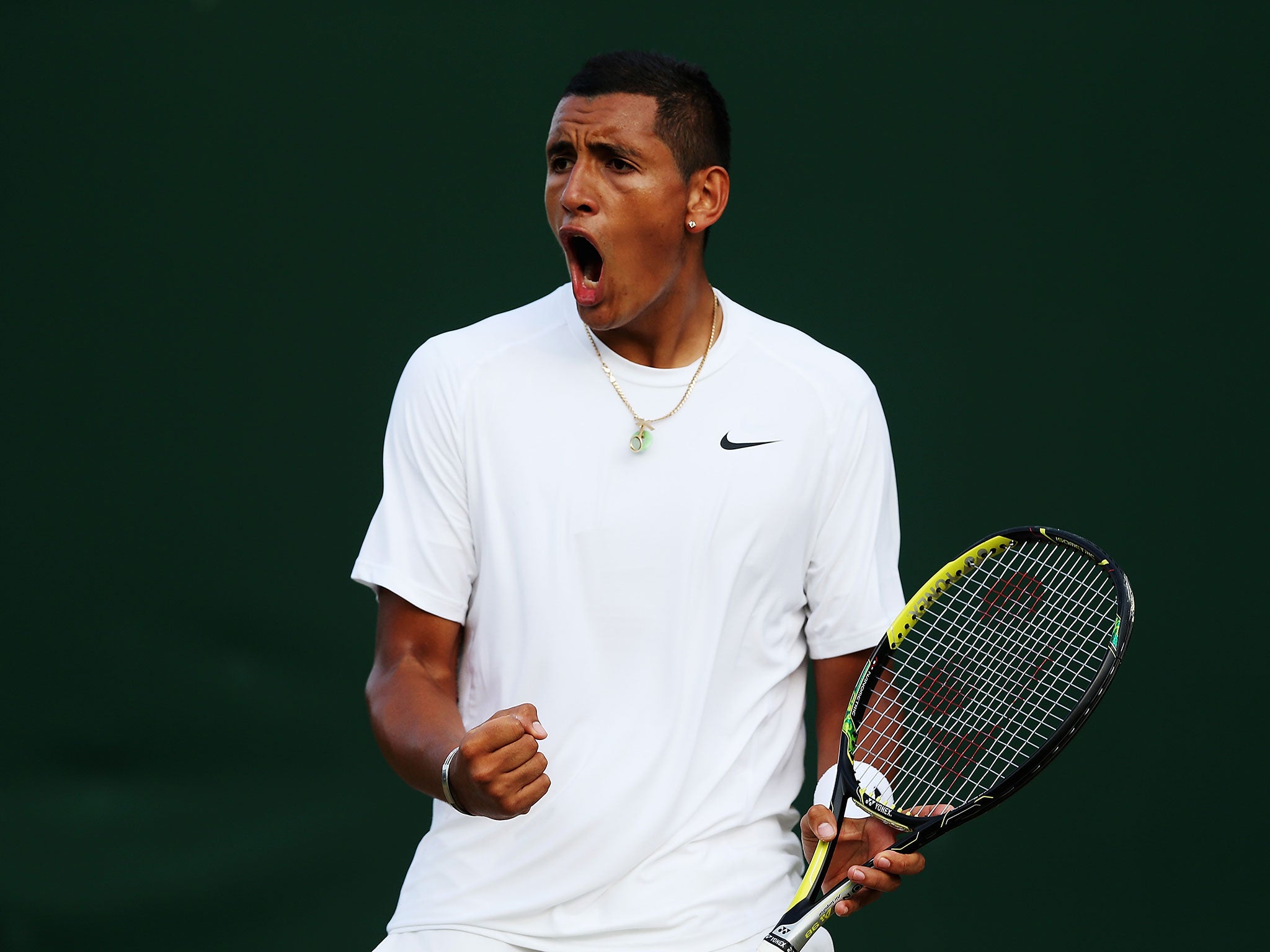Michael Calvin on Wimbledon 2014: 'Canberra kid' Nick Kyrgios can gatecrash top-four party
The Calvin Report: Wild card Aussie, aged 19 and ranked 144th in world, injects fresh blood and earns match against Rafael Nadal

Nine Lives survives. Nick Kyrgios, a banana-munching, fast-tweeting answer to the prayers of those with a vested interest in the health and wealth of world tennis, has the Gang of Four in his sights. It is enough to distract Australia from its national sport, baiting the England cricket captain.
Kyrgios, a wild card whose supporters like to think they walk on the wild side, defied logic and his world ranking of 144 to earn a fourth-round match against Rafael Nadal. His four-set win over Jiri Vesely, another former world junior No 1, provided a transfusion of power and passion.
Tennis is as vulnerable as any other major sport to over-familiarity. The Wimbledon title has been shared, for the past 11 years, by Nadal, Roger Federer, Novak Djokovic and Andy Murray. Overshadowed by the drama and exotic setting of the World Cup, the Championships require new blood, more distinctive personalities.
Nadal’s facile victory over Mikhail Kukushkin of Kazakhstan conformed to a pattern. He lost the first set, treated it as an indulgence, and conceded only three more games. He is where he wants to be, in his comfort zone entering the second week.
The tyros might have been condemned to Court 17 – spectators were seven deep in the aisles and grabbed any vantage point, however precarious – but they gave a glimpse into the future.
Vesely, ranked 68 in the world, is a sculpted athlete of 6ft 6in who started playing tennis at the age of four. Kyrgios, who took up the game aged six, is one of two teenaged Greek-Australians seeking to succeed Lleyton Hewitt, whose bionic body was finally carried out of SW19 on his shield on Friday evening.
The other, Thanasi Kokkinakis, has the most appropriately named fitness coach in sport, Peter Punnisher. Some good judges feel he has greater potential, which is a big call given that Pat Cash, the 1987 Wimbledon champion, has anointed Kyrgios as “the future of tennis”. Australia, which has not had a Grand Slam champion since Hewitt won Wimbledon in 2002, is agog.
He has a good range of shots, most particularly a lacerating forehand, and possesses a flair for social media. Since his tweets are punctuated by four hashtags – #NKRising #BringIt #LoveGrass #Leggo – he is hardly a shrinking violet.
He lifted the spirits, because there is no more miserable place in sport, when it rains, than the All England Club. The legion of the lost, identifiable by their unofficial uniform of transparent plastic ponchos, overstuffed rucksacks and darkly ironic sunglasses, circulated for hours today in ever-decreasing circles. Thousands of other would-be spectators had little option but to mix frantic retail therapy in crowded merchandise shops with cloud-watching of greater intensity than anything undertaken by Christopher Robin and Winnie the Pooh.
Those described as “the lucky ones on the hill”, in the faintly absurd, fawning manner that characterises the BBC’s approach to the Championships, could have saved queuing time and visited the local car wash. Murray Mount was moist, misty and utterly uninspiring.
It is no longer enough to rely on rituals, so deeply ingrained that the old place should be preserved in aspic. Everything, from comedic pigeons to overpriced strawberries and indolent British prodigies is recycled without quickening the pulse. The ghost of Fred Perry has left the building.
Nadal, seeking his 15th Grand Slam title, remains a class act. He tolerated the autograph-seekers with grace and was in ambassadorial mood. Revealingly, given the nature of his authority and the lack of challengers outside the usual suspects, he was asked to dwell on the example set to younger players.
“We are fighters, fighters for every single tournament, even if it is a Grand Slam, Masters 1000, or 250,” he said. “We fight for the whole year, another year, another year, and another year. I think that’s a good example for the kids, our motivation and passion for the game.
“The positive thing about this era is we played each other a lot of times, under a lot of pressure, playing for very important things, for our careers. Yet when we are in the locker room we still talk to each other. We have a very good relationship between us. That’s important because at the end the tennis is only a game.”
He could have prevaricated, or indulged in empty praise, but chose to acknowledge a lack of deep knowledge of Kyrgios, christened “Nine Lives” by the Aussie press, following his act of escapology against the 13th seed Richard Gasquet.
He needed to live up to his nickname when the rain finally relented at 6pm. Broken in his initial service game, he lost the opening set 6-3. His cheerleading crew, in matching yellow ponchos, pumped up the volume. This may not have been unconnected to the fact they had been necking warm Pinot Grigio from the bottle since lunchtime.
Suitably inspired, he took the next three sets 6-3 7-5 6-2, hitting 26 aces and bouncing around like a hyperactive toddler. The kid from Canberra, only 19, has arrived – and not before time.
Subscribe to Independent Premium to bookmark this article
Want to bookmark your favourite articles and stories to read or reference later? Start your Independent Premium subscription today.

Join our commenting forum
Join thought-provoking conversations, follow other Independent readers and see their replies